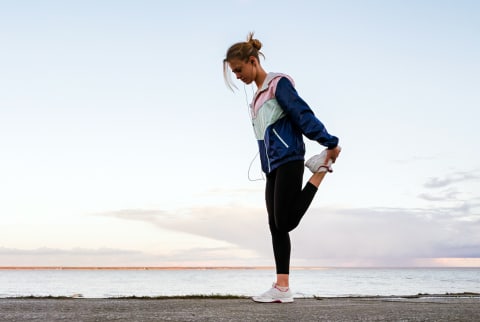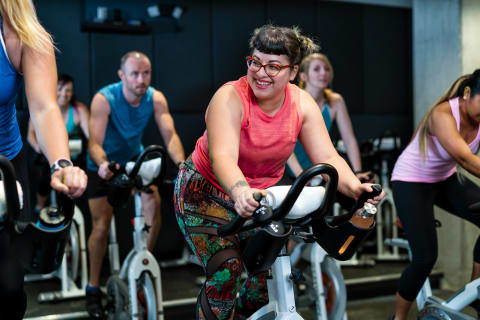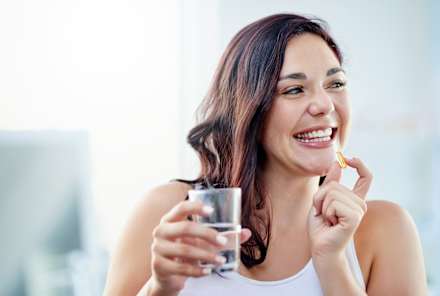Advertisement

We've all been there: You schedule a tough workout into your calendar, get to the class on time, work up a major sweat, take a nice, hot shower after class, and then...forget to drink much water after all that, leaving you totally dehydrated.
We go through so much effort to keep our bodies strong and healthy, but we often forget the easiest part of the entire routine: hydrating before and during a workout and rehydrating after it's over. And the thing is, skipping out on adequate hydration can affect your overall workout routine—and not in a good way.
"Given that the body is made up of approximately 60 percent water, proper hydration is crucial to performance," explains Greg Justice, an exercise physiologist at AYC Health & Fitness based in Kansas City. "Whether it's before, during, or after a workout, if your body isn't properly hydrated, you increase your risk of heat exhaustion or even heat stroke. It can also cause lightheadedness, muscle cramping, and an overall lack of energy," he continues—not ideal when it comes to a regular exercise routine, not to mention high-intensity workouts.
Start before your workout does.
Even if you don't feel fatigued, thirst during a workout is an indicator that you're already in dehydration territory. Studies show that even mild dehydration negatively affects performance during exercise1 lasting longer than 30 minutes, so on days you're putting your body through strenuous activity—whether it's a studio class, a run, or a hike—hydrating before you start breaking a sweat helps big time.

When you're exercising, Justice explains, your body temperature increases—and being pre-hydrated allows your body to sweat during your workout, which in turn helps regulate your changing body temperature.
To make this happen, the American Council on Exercise recommends drinking 17 to 20 ounces of water (a little more than two cups) two to three hours before exercise and another 8 ounces (about one cup) about half an hour before you go, he explains. That way, your body will have the tools it needs to work hard, keep your fluids at healthy levels, and prevent that lack of energy Justice cautions about.
Take that water break—seriously.
Think of it this way: As the volume of fluid in your body falls, your blood volume also dips, and your heart will pump less blood to the rest of your body with each heartbeat. That means it has to work much harder, increasing your heart rate, to compensate for the drop in blood volume.
In other words, when you start to dehydrate, your heart becomes less efficient at pumping blood to your muscles doing the work. The result? The exercise feels harder, you lose energy and tire out more quickly, and your performance drops off.
Prevent this by actually taking those 30 seconds between reps to drink up. Before your workout, consider dropping a Nuun's Sport electrolyte tablet into your water bottle for a hydrating boost. The fizzy dissolvable tablets contain vital nutrients for optimal hydration—sodium for fluid balance, chloride to facilitate fluid transport, magnesium to relax muscles, potassium to prevent cramps, and calcium to support normal muscle function. Aim for at least 7 to 10 ounces of water every 20 minutes while you're working out. Infused with one of Nuun's 13 delicious flavors, though, don't be surprised if you find yourself guzzling up more than that.
Keep it going post-workout (it's just as important as protein!).
"When we sweat, we lose water and all these minerals, aka electrolytes," continues Justice, "but it's especially important to replace electrolytes after an intense workout session that caused excessive sweating," he continues.
The American Council on Exercise recommends drinking 8 ounces of fluid 30 minutes after your work out, followed by 16 to 24 ounces of fluid for every pound of body weight you lost during your workout. Add one Nuun Sport electrolyte tablet to every 16-ounce glass of water that you drink, and you'll be golden.

A Harvard Study Just Linked 4 Diets To Longevity: Here's What They Are
Gretchen Lidicker, M.S.

Research Calls Out Concerning Potential Side Effects Of Melatonin
Gretchen Lidicker, M.S.

A Harvard Study Just Linked 4 Diets To Longevity: Here's What They Are
Gretchen Lidicker, M.S.

Research Calls Out Concerning Potential Side Effects Of Melatonin
Gretchen Lidicker, M.S.

A Harvard Study Just Linked 4 Diets To Longevity: Here's What They Are
Gretchen Lidicker, M.S.

Research Calls Out Concerning Potential Side Effects Of Melatonin
Gretchen Lidicker, M.S.

A Harvard Study Just Linked 4 Diets To Longevity: Here's What They Are
Gretchen Lidicker, M.S.

Research Calls Out Concerning Potential Side Effects Of Melatonin
Gretchen Lidicker, M.S.








